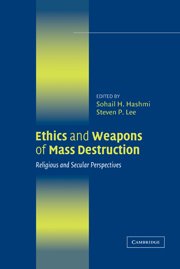Book contents
- Frontmatter
- Contents
- Tables and Figures
- Acknowledgments
- Abbreviations
- Ethics and Weapons of Mass Destruction
- Introduction
- 1 Weapons of Mass Destruction: A Brief Overview
- 2 The International Law Concerning Weapons of Mass Destruction
- PART ONE THE ORIGINAL DEBATE
- PART TWO EXPANDING THE CONVERSATION
- 11 Buddhist Perspectives on Weapons of Mass Destruction
- 12 Buddhism and Weapons of Mass Destruction: An Oxymoron?
- 13 Confucianism and Weapons of Mass Destruction
- 14 “Heaven's Mandate” and the Concept of War in Early Confucianism
- 15 Hinduism and the Ethics of Weapons of Mass Destruction
- 16 Hinduism and Weapons of Mass Destruction: Pacifist, Prudential, and Political
- 17 Islamic Ethics and Weapons of Mass Destruction: An Argument for Nonproliferation
- 18 “Do Not Violate the Limit”: Three Issues in Islamic Thinking on Weapons of Mass Destruction
- 19 Judaism, War, and Weapons of Mass Destruction
- 20 Between the Bible and the Holocaust: Three Sources for Jewish Perspectives on Mass Destruction
- PART THREE CRITICAL PERSPECTIVES
- Contributors
- Index
17 - Islamic Ethics and Weapons of Mass Destruction: An Argument for Nonproliferation
Published online by Cambridge University Press: 05 June 2012
- Frontmatter
- Contents
- Tables and Figures
- Acknowledgments
- Abbreviations
- Ethics and Weapons of Mass Destruction
- Introduction
- 1 Weapons of Mass Destruction: A Brief Overview
- 2 The International Law Concerning Weapons of Mass Destruction
- PART ONE THE ORIGINAL DEBATE
- PART TWO EXPANDING THE CONVERSATION
- 11 Buddhist Perspectives on Weapons of Mass Destruction
- 12 Buddhism and Weapons of Mass Destruction: An Oxymoron?
- 13 Confucianism and Weapons of Mass Destruction
- 14 “Heaven's Mandate” and the Concept of War in Early Confucianism
- 15 Hinduism and the Ethics of Weapons of Mass Destruction
- 16 Hinduism and Weapons of Mass Destruction: Pacifist, Prudential, and Political
- 17 Islamic Ethics and Weapons of Mass Destruction: An Argument for Nonproliferation
- 18 “Do Not Violate the Limit”: Three Issues in Islamic Thinking on Weapons of Mass Destruction
- 19 Judaism, War, and Weapons of Mass Destruction
- 20 Between the Bible and the Holocaust: Three Sources for Jewish Perspectives on Mass Destruction
- PART THREE CRITICAL PERSPECTIVES
- Contributors
- Index
Summary
Since the early 1960s, several Muslim states have figured prominently in international concerns on proliferation of weapons of mass destruction. The Comprehensive Test Ban Treaty lists seven Muslim-majority states among the forty-four “nuclear-capable” states whose ratification is necessary for the treaty to enter into force: Algeria, Bangladesh, Egypt, Indonesia, Iran, Pakistan, and Turkey. Pakistan, of course, became a confirmed nuclear power in May 1998. Not included in this list are three other states that are known to have sought nuclear capability: Iraq, Libya, and Syria. Iraq not only came close to developing nuclear weapons during the 1980s, but it was also a leading developer of chemical and biological weapons. Its repeated use of chemical weapons against Iranians and Kurds during the Iran-Iraq War is one of the most egregious violations of international agreements banning the use of such weapons. Iraq is, however, not alone among Muslim states in having stockpiled and used chemical weapons, nor in developing biological weapons.
Aside from these states, the threat posed by Muslim terrorist groups has steadily increased over the past decade. Because of its financial resources, its network of affiliated organizations around the world, and the technical sophistication of its recruits, al-Qa'ida is justifiably perceived as the principal WMD terrorist threat today. Documents and crude laboratories uncovered by coalition forces in Afghanistan indicate that the network led by Usama bin Ladin tried actively to develop or acquire chemical, biological, and nuclear weapons.
- Type
- Chapter
- Information
- Ethics and Weapons of Mass DestructionReligious and Secular Perspectives, pp. 321 - 352Publisher: Cambridge University PressPrint publication year: 2004
- 4
- Cited by



